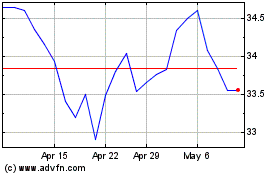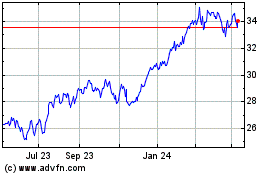NAB Fiscal Year Profit Up 7.6%, Raises Dividend -- Update
November 08 2023 - 4:20PM
Dow Jones News
By Alice Uribe
SYDNEY--National Australia Bank said increased lending and
deposits in its business-related divisions helped to drive a 7.6%
increase in its annual profit and an almost 8% improvement in its
dividend.
The bank said net profit for the 12 months through September
rose to 7.41 billion Australian dollars (US$4.74 billion). Analysts
had expected a full-year net profit of A$7.71 billion, according to
FactSet's consensus estimate.
Cash earnings--a profitability measure tracked closely by
analysts--rose by 8.8% to A$7.73 billion.
Still, Chief Executive Ross McEwan said challenges in the
operating environment became more evident as fiscal 2023
progressed, reflecting the impacts of monetary policy tightening
and inflationary pressures on households and the economy.
This had led to its financial results softening in the second
half of the period, compared to the previous six months. "While the
economic transition has further to go, we are well placed to
navigate this environment," McEwan said. "We continue to see
attractive growth options and productivity is helping us manage
inflationary pressures."
NAB's annual operating expenses rose 9.1% to A$9.02 billion,
partly due to higher personnel costs and continued investment in
technology and compliance capabilities, the lender said.
At a divisional level, the Corporate and Institutional banking
unit's annual cash earnings rose by 15% to A$1.87 billion, while
the Business and Private Banking unit's cash earnings rose by 10%
to A$3.32 billion. Still, NAB's Personal Banking unit's cash
earnings fell by 9.1% to A$1.45 billion.
NAB's net interest margin--the difference between the interest
income generated and the amount of interest paid out to
lenders--rose 9 basis points to 1.74%, and on an adjusted basis it
rose 14 basis points.
The lender said this reflected higher earnings on deposits and
capital as a result of the rising interest rate environment,
partially offset by mortgage competition, deposit mix and higher
wholesale funding costs.
NAB, like other lenders, has benefited from the rising interest
rate environment. The Reserve Bank of Australia this week raised
its official cash rate by 25 basis points to 4.35%, marking the
first hike since July, following the news of higher-than-expected
inflation in the third quarter.
But the lender said the benefits of higher rates through FY 2023
had been increasingly offset by competition and inflationary
pressures in the second half of the year. Some analysts believe
that Australian lenders may soon see limited earnings growth, with
the rates tailwind for net interest margin and earnings likely to
slow into FY 2024 and beyond.
NAB said with inflation moderating, the cash rate looked to be
at or near peak levels.
"The extent to which households continue to adjust to cost of
living pressures and higher interest rates and the timeframe over
which inflation softens remain key to the outlook including the
path of monetary policy," NAB said.
For fiscal 2023 the ratio of 90+ days past due and gross
impaired assets to gross loans and acceptances increased by 9 bps
to 0.75%, which NAB said was driven by higher delinquencies across
the home loan and business lending portfolios.
Directors of the company raised the final dividend to A$0.84 per
share, compared with A$0.78 a year ago, while the group's Common
Equity Tier 1 capital ratio was 12.22% at the end of September,
compared with 11.51% the previous year.
Write to Alice Uribe at alice.uribe@wsj.com
(END) Dow Jones Newswires
November 08, 2023 17:05 ET (22:05 GMT)
Copyright (c) 2023 Dow Jones & Company, Inc.
National Australia Bank (ASX:NAB)
Historical Stock Chart
From Oct 2024 to Nov 2024

National Australia Bank (ASX:NAB)
Historical Stock Chart
From Nov 2023 to Nov 2024
